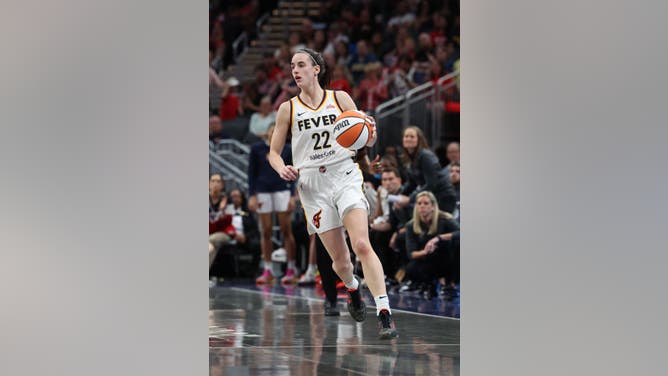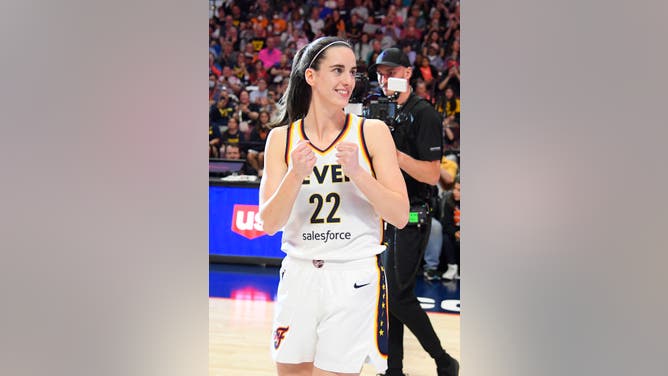Caitlin Clark's And Winless Indiana's TV Ratings Dip, And She's Still White | Glenn Guilbeau
Caitlin Clark's streak of four games in which she set television ratings records fell Saturday afternoon on ABC as viewership finally dipped.
Last Tuesday night, Clark's pro regular season debut with the Indiana Fever as the WNBA's first pick of the 2024 draft against the Connecticut Sun on ESPN2 drew an average of 2.12 million viewers - the most for a WNBA game since 2001. And that happened despite the game going against the NBA Playoffs. But last Saturday at 1 p.m. on ABC, Clark's game against the New York Liberty dropped to 1.71 million viewership with no NBA or NHL playoffs on at the same time.
Indiana also fell to 0-3 on the season Saturday with the loss to New York, 91-80, marking the team's third straight loss by double digits. That could have something to do with the ratings, which may continue to fall. The Fever dropped to 0-4 on Monday night in an 88-84 loss to Connecticut.
And Clark is not exactly ripping up the WNBA. She is playing better of late and shook off an ankle injury Monday night to finish with 17 points and five assists.

Indiana Fever point guard Caitlin Clark dribbles against the Connecticut Sun Monday night at Gainbridge Fieldhouse in Indianapolis, Indiana. (Getty Images)
But after leading the nation in scoring with 32 points a game, in assists with 8.9 a game and in 3-pointers a game with five at Iowa last season, she is down to 17 points, 5.5 assists and 3.0 3-pointers a game. Her rebounding is also down from 7.4 rebounds a game to 4.0 and is up in turnovers from 4.7 a game to 6.5.
That may be why fewer people are watching. That and the fact that her most-watched college games tended to be much more significant than early season WNBA games, which are much like early season NBA games - not that significant.
Caitlin Clark Finished At Iowa With A TV Ratings Frenzy
Clark's last three games in college at Iowa were the most watched women's college basketball games ever.
An average of 18.9 million watched Iowa lose to South Carolina, 87-75, in the national championship game on April 7 after a 14.2 million average watched Iowa's 71-69 win over UConn in a Final Four semifinal on April 5. An average of 12.3 million watched Iowa's 94-87 win over defending national champion LSU on April 1 to reach the Final Four.
Several media members, particularly Jemele Hill, and former NFL star wide receiver Antonio Brown have said, or intimated, for much of this year that Clark's rare, iconic fame for a women's basketball player this year has happened largely because she's white in a predominantly black sport.
JEMELE HILL UPDATE: She's At It Again
- Never mind that Clark became the NCAA's leading all-time, career scorer - men or women - when she broke Pistol Pete Maravich's scoring record of 3,667 points on March 3 and finished with 3,951 points.
- Never mind that her college and pro games have featured routinely, longer 3-point shots - logo threes - than any of her predecessors in women's basketball history.
- Never mind that professional golfer Tiger Woods became an iconic figure in a predominantly white sport in 1997 without nearly the amount of backlash from white media.
- Never mind that some of the most iconic athletes in all sports in addition to Woods for decades have been black without as much media backlash - Michael Jordan, Magic Johnson, Kobe Bryant and LeBron James of the NBA, Bo Jackson and Deion Sanders of the NFL and Major League Baseball.
OPINION: Caitlin Clark's Race Has Little To Do With Her Fame
ESPN's Jay Williams ridiculously said last February that he wouldn't truly praise Clark's achievements at Iowa until she won a national championship, which she never did. Never mind that many of the world's greatest never won the ultimate prize, such as Maravich, Charles Barkley and Elgin Baylor in the NBA, Dan Marino, Dick Butkus and Barry Sanders in the NFL, Barry Bonds, Ty Cobb and Carl Yastrzemski in MLB and Jackson in the NFL and MLB, to name only a few black and white athletes.
Hill can't let go of her anti-white-Caitlin narrative.
"We would all be very naive if we didn't say race and her sexuality played a role in her popularity," Hill said to the Los Angeles Times recently.
And Nicole Melton, a co-director of the Laboratory for Inclusion and Diversity in Sport at the University of Massachusetts, has also been quoted along the lines of Hill's agenda.

Caitlin Clark just before her first regular season game as a pro for the Indiana Fever against the Connecticut Sun at the Mohegan Sun Arena in Uncasville, Connecticut, last Tuesday. The game was the most watched WNBA game since 2001. (Getty Images)
"Caitlin fits a very comfortable narrative for a lot of people in the United States," Melton said. "She comes from the heartland. She's an amazing talent. She's also a white, straight woman, right? There's not a lot of things that would make people feel uncomfortable with that person being successful."
Funny, Woods and Jordan are straight, not white and not from the heartland. I don't remember many people feeling uncomfortable about their success. Maybe, Melton feels a little too uncomfortable with Clark's success?
What Hill and Melton and others fail to see is that it's not all about skin color, gender or sexuality in sports. For the most part at the end of the day, it's how good you are and how unique you are in being so good.
For Caitlin, The Main Thing Is The Long Ball
The main reason Clark became so iconic is because of how well she shoots the long ball and passes and rebounds and runs so well. That and the fact that she's a point guard, which means she's basically a quarterback. This is why she replaced Angel Reese, who is black, as the No. 1 player in women's college basketball late in the 2022-23 season and then lapped her prodigiously this past season.
That's what really got Antonio Brown mad and Hill, I believe. Clark blew away Reese, who is not a quarterback and doesn't run well. She's like a great pass-catching tight end. She's a great rebounder and pretty good scorer, but she's not a quarterback. And she's not a superstar on the level of Clark.
But the main thing that has set Clark apart is the long, logo threes. Chicks dig the long ball, you may have heard. So do dudes. It's why Sammy Sosa, who is not white, and Mark McGwire, who is, made Major League Baseball so popular again in 1998 with the home run chase.
Clark got so famous and so iconic and is a marketing dream mainly because of how she plays. Nobody in women's basketball shoots from that far out so well and never has. The white thing is only a novelty, much like Woods being black was a novelty, but mainly only at first. After a while, he stayed iconic because of how good he was - and mainly for how long he hit the ball off the tee.
Hill and other media members seem to think Clark is the first great white women's basketball player to come around. But there have been many other great white women's basketball players - Kelsey Plum, Sue Bird, Diana Taurasi, Nancy Lieberman, Sabrina Ionesca, Breanna Stewart. And none of them created a Caitlin-like frenzy. So, maybe it's just CLARK, not her COLOR.
And if USC's JuJu Watkins, who is black, continues to score on Clark's level over the next year or so, she will likely become just as iconic as Clark, if not more, with Jemele Hill and many others like-minded media members carrying that flag.
It's About Talent, Not Color
The great thing about sports is, if the athlete is really great and stays great, people put what color he or she is on the back burner. Maybe one day, Jemele Hill and Nicole Melton and Jay Williams and Antonio Brown and some white media members as well, will do the same.
And if the athlete or the team that athlete is on suddenly dips in production, people will turn them off.
That's what is happening to Caitlin Clark now. Not as many people of all colors are watching. So I guess, all those supposed white racists who were watching her so much because she's white and are now switching channels, maybe they're not racists.
Maybe America watched Caitlin Clark so much on television and in person in college because she was so uniquely great, and Iowa was really good. The Indiana Fever is 0-4, and the novelty may soon be over.
Maybe the TV ratings and attendance will continue to decrease for Clark's WNBA games because the Indiana Fever is not a good team, and because of that and more competition, Caitlin won't shine as much as she did at Iowa.
It's pretty black and white. It doesn't matter what color you are in sports. You just have to be great.